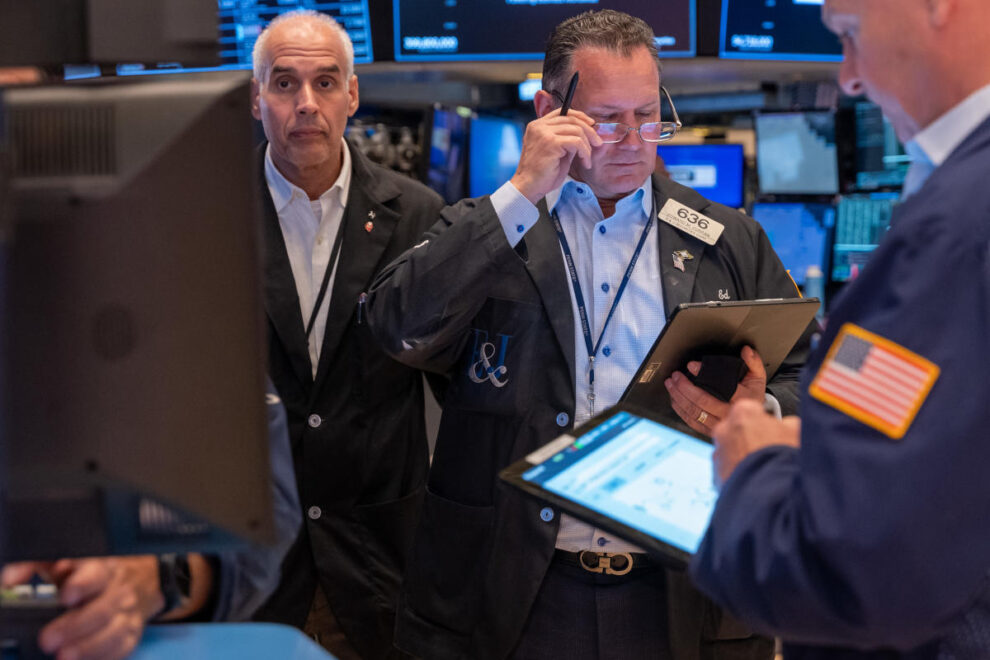(Bloomberg) — Stocks struggled in the final stretch of a strong quarter that’s seen a small group high-flying technology shares lead the way.
Most Read from Bloomberg
A recent market attempt to broaden out of the megacap group was short-lived, with a bevy of measures still showing how market breadth remains weak — boosting uncertainty about the rally’s staying power. Bifurcation between S&P 500 performance and breadth has reached one of the worst levels in three decades, according to Bloomberg Intelligence data.
“The stock market is way too reliant on big tech — period and end of story,” said David Bahnsen at The Bahnsen Group. “Whether or not the past week’s volatility in tech is the start of something deeper or if that reckoning is still forthcoming remains to be seen, but excessive investor sentiment, euphoria and overdone momentum always ends the same.”
The S&P 500 hovered near 5,470. Nvidia Corp. whipsawed ahead of its shareholder meeting. Micron Technology Inc.’s upcoming earnings will test its artificial intelligence-driven rally. FedEx Corp. surged on a bullish forecast and buyback plans. The Federal Reserve will release the results of its bank stress tests later Wednesday.
Treasury 10-year yields topped 4.3%. That’s ahead of a $70 billion five-year auction. The dollar hit the highest since November. The yen weakened to the lowest since 1986, spurring intervention bets.
“The market’s ‘Engine Warning Light’ is on as we head into the hot summer months,” said Craig Johnson at Piper Sandler. “Investors in the tech-heavy indices are experiencing F.O.M.O, while investors in the rest of the market feel R.O.M.O (regret of missing out) as overall market breadth remains weak outside a handful of mega-cap stocks. We believe the S&P 500 is overdue for maintenance.”
Mark Haefele at UBS Global Wealth Management, says that while Nvidia’s volatility has driven sentiment, the structural investment case for artificial intelligence remains intact on positive AI adoption and monetization trends. He also holds a constructive outlook for broader equities amid solid fundamentals.
“We maintain our positive view on the AI story, but believe rightsizing tech exposure is key to navigate volatility while maintaining strategic exposure to the technology that we think is set to drive growth in the coming years,” he added.
For the second-quarter earnings season, the “Magnificent Seven” megacaps are still expected to account for the bulk of the growth for the overall S&P 500, according to Ryan Grabinski at Strategas.
“What remains encouraging to us is that the estimates for the remaining 493 are improving starting in the third quarter as growth rates for both the top of the market and the rest of the market normalize,” he noted. “Should this broadening come to fruition, it would be an encouraging sign for the sustainability of the bull market.”
Meantime, Bahnsen says that the biggest risk for the stock market right now is excessive valuations.
“The stock market right now is very expensive. Valuation is the largest risk, if everything stays good, and anything that is bad that may come about is unforeseeable by definition,” he added. “The need for overvaluations in stocks to correct is not just visible, it is inevitable.”
Falling correlations are another byproduct of a handful of stocks occupying hefty portions of headline indices, according to Greg Swenson at The Leuthold Group. With the “Magnificent Seven” megacaps driving returns on a daily basis, the other 593 stocks have become less correlated with the S&P 500’s day-to-day changes.
“Although dropping correlations are typically a good thing for active managers, we think this time is different, Swenson said. “Lower correlations are only a good thing if the manager is correctly positioned in the areas that are outperforming — and we doubt the average all-cap, and even large-cap manager has anywhere near the benchmark’s exposure to the top names.”
Meantime, the biggest US banks haven’t waited for this week’s stress tests to signal optimism about their capital levels.
The six largest lenders bought back more than $14 billion of stock in the first quarter, a 73% jump from the meager pace in last year’s second half.
The annual exam from regulators — with results set to be released Wednesday afternoon — tends to set the tone on how aggressive banks are in returning capital to shareholders through dividends and buybacks.
Corporate Highlights:
-
Interactive Brokers Group Inc. took a $48 million hit after a New York Stock Exchange trading disruption this month and is considering its options to recover the money, including possible legal action.
-
Whirlpool Corp. surged after Reuters reported that Robert Bosch GmbH is considering an offer for the appliance maker.
-
A McDonald’s Corp. test of its plant-based burger in San Francisco and Dallas “was not successful in either market,” Joe Erlinger, the chain’s US chief, said Wednesday. Beyond Meat Inc. partnered with McDonald’s to produce the McPlant burger.
-
General Mills Inc., the maker of Cheerios and Old El Paso taco shells shares, gave a disappointing sales outlook as shoppers continue to pull back amid climbing supermarket prices.
-
Southwest Airlines Co. reduced its estimate for unit revenue in the second quarter, a sign of ongoing challenges at the carrier as it fends off an activist push for a management overhaul.
-
Volkswagen AG is taking another swing in its long struggle to catch up with Tesla Inc., plowing $5 billion into a tie-up with the US company’s closest would-be rival, Rivian Automotive Inc.
-
Airbus SE has been warning airlines that some of their aircraft deliveries due in the next two years risk being delayed, an indication that supply-chain glitches at the world’s largest planemaker might extend well beyond the current year.
Key events this week:
-
China industrial profits, Thursday
-
Eurozone economic confidence, consumer confidence, Thursday
-
US durable goods, initial jobless claims, GDP, Thursday
-
Nike releases earnings, Thursday
-
Japan Tokyo CPI, unemployment, industrial production, Friday
-
US PCE inflation, spending and income, University of Michigan consumer sentiment, Friday
-
Fed’s Thomas Barkin speaks, Friday
Some of the main moves in markets:
Stocks
-
The S&P 500 was little changed as of 11:53 a.m. New York time
-
The Nasdaq 100 rose 0.2%
-
The Dow Jones Industrial Average was little changed
-
The Stoxx Europe 600 fell 0.6%
-
The MSCI World Index fell 0.1%
Currencies
-
The Bloomberg Dollar Spot Index rose 0.3%
-
The euro fell 0.3% to $1.0687
-
The British pound fell 0.4% to $1.2629
-
The Japanese yen fell 0.6% to 160.68 per dollar
Cryptocurrencies
-
Bitcoin fell 0.8% to $61,425.44
-
Ether fell 1.5% to $3,360.65
Bonds
-
The yield on 10-year Treasuries advanced six basis points to 4.31%
-
Germany’s 10-year yield advanced four basis points to 2.45%
-
Britain’s 10-year yield advanced six basis points to 4.13%
Commodities
-
West Texas Intermediate crude fell 0.2% to $80.68 a barrel
-
Spot gold fell 0.8% to $2,300.02 an ounce
This story was produced with the assistance of Bloomberg Automation.
–With assistance from Alexandra Semenova.
Most Read from Bloomberg Businessweek
©2024 Bloomberg L.P.










